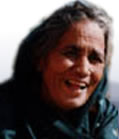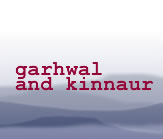 |
 |
||
 |
|||
|
GLOSSARY India glossary |
transcript |
| Section 1 | What is your name? Ram Dasi. |
Where do you come from? I come from the village of Krabha |
|
What is your caste? I am a Rajput. |
|
How old are you? Around 67 years. |
|
How far have you been educated? I am totally uneducated. |
|
Why did you not get educated? We had no schools and girls were not sent out. Getting education was considered bad. So I was not educated, much to my regret. I wanted it very much. |
|
What is your religion? I follow both Buddhism and Hinduism. |
|
What kind of clothes do people generally wear here? It's cold here throughout the year so we wear woollen clothes. I wear a dohadu (woollen dress worn by women in Kinnaur) but men wear woollen trousers and a coat. |
|
How many brothers and sisters are you? Are your parents alive? I have three brothers and two sisters. I lost my parents long ago. |
|
What is the altitude of your village? It's 8000 feet. |
|
How heavy is the snowfall? It is anything between five and seven feet, but sometimes it is less and at times much more. |
|
| Section 2 | What do you do when it snows? We generally stay indoors and spin wool. The elders recite old proverbs and narrate anecdotes about the past. |
Where do you get the water from when it snows? We melt snow in a pan and drink it. Even the cattle drink this water |
|
What is your main occupation? Agriculture. |
|
What did you do in your childhood, since you did not go to school? We used to be out with the cows the whole day, and kept playing our own games. It continued like that till we grew up (attained maturity). We wore torn clothes and hardly ever ate good food. |
|
Were none of your brothers or sisters educated? No, nobody. How could they be, in the absence of schools? Kalpa, Rampur Busher were far away, so going there was not possible. One could only reach there on foot. Parents did not want to send us away. So we all remained uneducated. |
|
Where are your brothers these days? All my sisters got married, and I too was married early by my parents. One of my brothers died looking after the sheep and goats. The other one is blind and stays at home. |
|
What do your brother's children do? My nephews and nieces are students since we now have schools in our village itself. |
|
What does your husband do? He also rears sheep and goats, and has some land. |
|
How many children do you have? I have three daughters and three sons. I educated them all, and got the daughters married. One of my sons is a shopkeeper, one is studying and the third one has joined the Army. |
|
What is the name of the electrification programme here? It's the Sanjay Hydro Electricity Project, which has been completed. It can generate 120 megawatts of electricity. |
|
Is this program useful for you? Oh - it is very useful. The locals have got employment. Many of our men are permanently working under this plan. Electricity generation is of immense use to our area, but it does have some disadvantages. Mainly, our lands have been taken away for this project. So we have less land now. Some people do not have any land at all, and the compensation given for land is not sufficient. Another problem the project has caused is that the population of the area has increased which has created a firewood crisis. And nowadays there is the constant fear of dacoity (robbery). |
|
| Section 3 | What is the water supply / availability like? Earlier we had to fetch water from a distance of 2 km but now there are water connections in every village and each house. |
Where do you get the food grains ground? These are grinding mills on rivers and tributaries where the food grains like gandam (wheat), barley, corn, koda (finger millet) are ground. This flour is very tasty. |
|
You are all doing farming, but which are the main harvests? Farming is the main source of our livelihood. We grow barley, kanda (?), ogla, fafra (varieties of buckwheat), chaulai (variety of amaranth), potato etc. We used to get good harvests earlier but due to uncertainties of the weather our crops do get destroyed. We mostly buy things from the market. |
|
Has apple growing been beneficial? Yes, it is if the crop is good. But quite a lot of the time during the flowering / blossom time it gets damaged due to hailstones. |
|
What fruits did you get earlier? In our times we got pears, walnut and other fruit. Now we have a great variety of apples. Earlier we used to get only wild apples called palati. |
|
Have you taken part in the literacy campaign? No, since I am quite old. |
|
Would you like to tell us about some important event in your life? I have led a tough life ever since my childhood. I have seen many ups and downs. During my early childhood I looked after a large number of cattle. My parents being very poor, I could not get a square meal. It was difficult for them to arrange two meals a day. They did not have a sufficient source of income. When I grew up I was married into an uneducated family. Here also I saw only deprivation and poverty. So my life has been full of problems and tensions. I worked in the fields with small children and could hardly ever afford a full meal. This affected my health badly and my eyesight grew weak. I get aches and pains. I do not keep good health. |
|
What do you know about health and medical care? Whenever I fall sick the first thing I do is to ask the gods and goddesses, and if they give permission I go in for treatment. Otherwise I slaughter a goat to appease the unfavourable stars. Today nobody believes in all this because of education. |
|
What are the development plans going on in your area? Are they good for you? These days the things are much better than before. We now get everything here. People get employment in the village itself. The government has started various development programmes in each village. School buildings have been constructed, roads are being built, mule tracks, forest development, electrification, agricultural development projects are the various activities going on. This is generating job opportunities as well as providing the basic necessities. All this is possible only because of the development work, which is going on. |
|
| Section 4 | How many castes are there in this area? We have Rajputs, untouchables, blacksmiths, carpenters and weavers. Each caste has a different occupation / profession. |
What do forests mean to you? Are they of any use to the people? Forests are the national wealth. Most of our needs are looked after by the forests. We get firewood, wood, herbs, fresh air, minerals and various precious things from the forests. The rivers and rivulets are also gifts of the forests. |
|
What are the means of transportation in this are? Earlier we had to cover the entire area on foot. Even now most of the area has only footpaths. The main national highway that goes to the border area is a very small distance away from here. There are many link roads but they do not connect many villages. There is no road in my village, even now. Earlier it took us months to reach Rampur so we had to carry enough foodstuff, but now it is not so. We do have buses to travel in and there are many places to stay on the way. |
|
Do you still believe in the caste system? In earlier times the caste system and untouchability were very strictly observed. Not everyone could go to the temples, religions places, places for fetching water, and even touching the untouchables was a sin. But now it is not so. Since Independence everyone has been able to go into the temple and to places of pilgrimage. Nobody looks down upon other castes. Here also this social evil is gradually disappearing. Everyone is considered equal. |
|
Do you have a joint family or a nuclear one? In my times we lived in a joint family and it was considered very good. But now it is considered socially bad and people prefer to live in small families. This is happening everywhere. It is good in a way. |
|
What is the difference between the standard of living in olden and modern times? Say 30 to 40 years ago people lived in a room full of smoke. Even guests were made to stay in that dark room. For lighting we burnt strips of chir (pine) wood and we used to work in that light. The smoke was harmful for people's health. Now we have got rid of that, as we get kerosene oil, and electricity has also reached our village. I now have a separate place for guests, and a separate kitchen for cooking. So now there is no problem of smoke. Our health does not suffer and our hands and faces do not get black. We are not inhaling carbon any longer. |
|
How do you look after the guests here? We look after our guests in a special way. They have a separate place to stay, are given good food, mainly meat and drinks. While parting we give than a Kinnauri (from Kinnaur) cap to wear. |
|
Do you give equal shares [of property] to boys and girls? So far no girl has inherited parental property but if a girl remains unmarried, by some chance, then she is given some land which goes back to either the parents or brothers when she dies. But parental property is equally distributed among sons. This is done either by the numberdar (community head/local revenue officer), or village mukhia (head assistant to the pradhan – head of panchayat) or some man of position of the village. |
|
| Section 5 | Do you object to adopting family planning or has it been forced upon you? Initially the very mention of this programme enraged people. They refused to tolerate it. People thought that the birth of children was God's gift. Nobody should put a check on this natural phenomenon. But with the spread of education and of people's proper advice regarding the population problem today, people have started accepting it. Now everybody can see the point. The population is increasing but not the land. So when land is divided and getting less and less the day is not very far when there will be no place left for us to stand. |